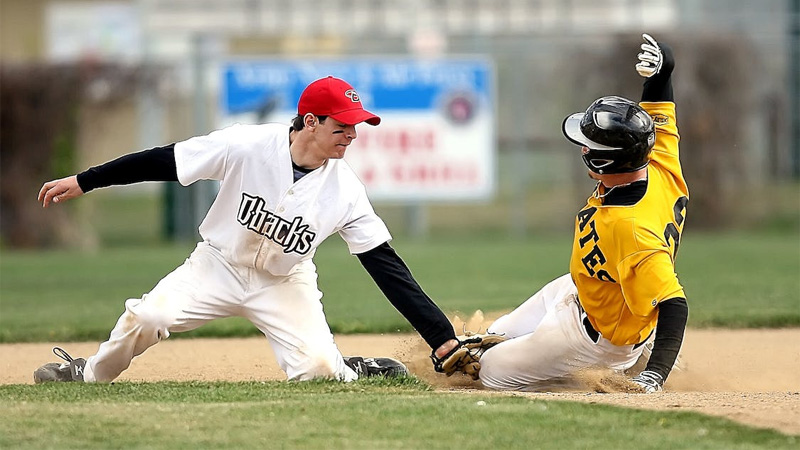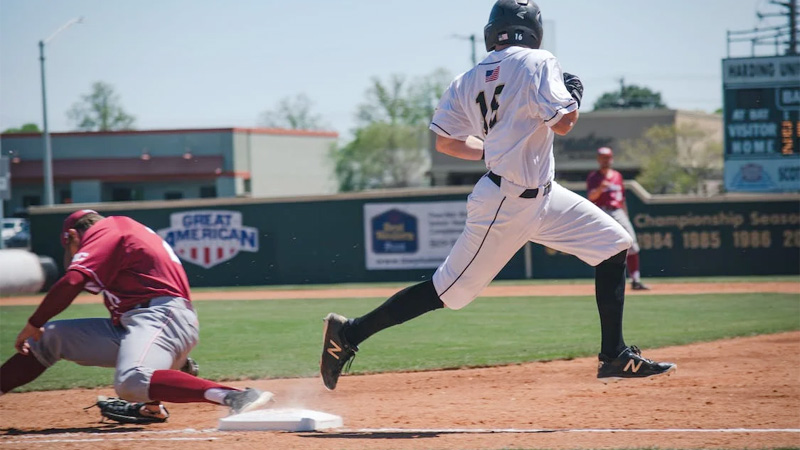If you enjoy baseball matches regularly, you must encounter a situation where the manager of a team asks the umpire or gives him a signal for a replay.
In most cases, the manager’s prediction brings success to the team. This phenomena is known as the Managers Challenge and when it happens in MLB, it is called the Major League Baseball Challenge rules.
No doubt that the manager’s challenge is one of the most significant parts of a baseball match and that’s the same reason the role of the manager is not less than any other member of a team. However, this fact is not as easy as it sounds.
Indeed, the manager can’t call a request for a replay anytime he wants. There is a set of some hard and fast rules for the managers of the baseball team to make a call for replay review. And that’s why understanding the Major League Baseball challenges rules is so essential.
If the entire fact goes over your head, I think you are on the right track. In this article, we will learn almost everything about the Managers challenge. Let’s start it.
What Are Major League Baseball Challenge Rules?

In a Baseball match, the manager of a team usually has a call to make to the umpire asking him to replay a fact while the match is running. This is known as the manager’s call.
However, a manager cannot make as many calls as he wants or just anytime to challenge the call. Indeed, the manager’s challenge system has some hard and fast rules to follow.
As we know, for the Postseason game, All-Star Game, and Divisional or Wild Card tiebreaker game, each club receives 2 specific manager challenges. And for other games, they get a single-manager challenge as usual.
To conduct and review all the challenges, the Replay Command Center, MLB Advanced Media headquarters, New York, works according to the rules. Replay officials of the RCC usually recheck all the subjects, if needed, review them. Finally, they try to reach a conclusion on whatever they should do from the following facts:
- Confirm the call on the ground
- Stand the call on the ground
- Change the call on the ground
They try to go for the final decision based on the proper evidence. At this time, the manager of any team can challenge to review the call in a single play. In this case, the club holds fast to the manager’s challenge if the RCC officials reverse the challenged call and the manager’s challenge will be lost if the officials don’t revoke the call.
But sometimes, the club becomes exhausted, and then it will lose the opportunity to challenge more. For the challenge, the manager will have only 20 seconds as the time limit. He needs to inform the umpire about his challenge. For that, he can go for verbal communication or just give him a signal if he is standing away.
In a Baseball match, managers of both teams can wish for a challenge. And the officials are bound to revoke all their reviewable calls that happen while the match is running. In this case, the managers need to make sure that he has informed the umpire about the specific call. But he doesn’t need to explain the reason to the umpire.
On the other side, the replay officials don’t have any authority to review any call except the one that the manager makes using the Manager Challenge rule.
History of MLB Challenge Rule

For the very first time, MLB went for this type of action on 28 August 2008. But that time, it was not made as a rule, and managers of the teams couldn’t request the replay even if they encountered something unusual.
The fact was established as a rule for the first time in the 2014’s season. Since then, managers get the opportunity to Challenge a call and it has now been called the manager challenge. In the 2014 season, MLB allowed the managers of both teams to challenge. And they allowed 2 challenges in a single match from each manager.
The first call was overturned and then a wider range of calls were reviewed. However, the authority modified the replay call system once again in 2015. This time they allowed the managers to request a challenge after the overturned calls only. And it allowed them to give a signal to the umpire for a challenge while an inning is ongoing.
That time, the managers of the Postseason games, All-star games, and the Wild Card tiebreaker games got two challenges in each match. That time, the manager got 20 seconds, though in 2017, the time limit was extended and it became 30 seconds. But in 2020, the time limit was decreased again and it was 20 seconds like before.
MLB Challenge Rule: Explanation

The manager’s challenge is a type of rule in baseball that helps to get a fair result in the match. It is a crystal-clear set of rules that has almost no sort of complexities. The committee has set the rules so that both teams get equal opportunities to win the match.
The Rule
Initially, the MLB rules for the manager challenges refer to the managers having a chance to request a replay review. In the regular and postseason games, this recall request often comes as effective.
Eventually, in the 2023 MLB, it was effective as well and it basically concerned the most potential contest. According to the rule, the managers have to hold up their hands to give the umpire a signal.
In the earlier decades, the managers got only 10 seconds to signal the umpire. Later on, the time limit was increased and it was 15 seconds. But now, managers usually get 20 seconds in total for deciding the challenges.
But some of the Leagues have decreased the time limit and still go for 15 seconds too. However, after the manager makes a request, the MLB replay team collaborates with Zoom and makes a live look at the ZROC which means the Zoom Replay Operates Center.
After that, an expert rule analyst comes to discuss the situation in the replay. The broadcasting team will join the rule analyst and reach the final decision. Their aim is to facilitate honest proof from the process of the review.
Number of Possible Challenges
At a point, you must be thinking about how many challenges can be made in the MLB. Usually, a manager has only one challenge to make in a regular season of MLB. In the first sixth innings, he will have the opportunity to challenge one call. In any case, if he loses a call, it will cause the opponent to take another action against them.
The rule of this manager challenge system was developed to make the game even more fair and reasonable. It decreases the possibility of turning the match in a particular team’s favour. That’s why the manager’s challenge is so important in any baseball match.
Reviewable Calls
Now the question is what are the situations that the managers can ask for a recall? Well, here I’ve pointed out the facts that are reviewable for the managers.
- Home Run Calls: A manager can challenge a potential home run call over the decision of the umpire. He can go against the umpire if he has confusion if the ball struck the fence top, or any other objects or a fan reaches the ball or it’s a foul.
- Non-home Run Boundary Calls: If the manager thinks that the ball is bounced out of the ground, or it was stricken, or a fan interference, or it’s a dead ball, he can challenge the umpire’s decision for a non-home run boundary call.
- Force Play Calls: The manager can challenge the call where the attempt of a defensive play tagging a runner to put him out or touch the base or if the runner got the base or not.
- Baserunning Calls: When a base runner passes through the preceding runner or he scores over a third out, or he touches the base, the Manager can challenge the call.
- Foul or Fair Ball Calls: The manager can challenge a call where a ball has a foul or he specified a fair ball during the match.
- Outfield Catch Play Calls: A call can be challenging when the manager encounters a fielder who catches a ball or he drives an outfield line before the ball hits the ground. But he can’t call a replay if it happens infield by a defensive player.
- Home Plate Collision Calls: When a runner deviates from his path so that he can contact the catcher and the catcher blocks his path without possessing the ball, the manager can go for a challenge.
- Pitch Hit Calls: If a player hits a pitched ball with a part of his clothes or his bat, the manager can call for a replay. Also, he can do that if the ball is in the strike zone after being touched by the batter or the batter avoids touching the ball.
- Calls for the Runners Placement: The manager can challenge a call that is involved in the placement of a batter and runner.
- Calls for the Tag-ups: If the runner leaves the base before it is time or just touches the base to catch a ball, the manager can request the replay.
- Interfered Double Play Calls: Also, the manager can request a call that is involved in a situation where a runner interferes with a Fielder to break up the foul play.
Besides the mentioned calls, a manager can also ask for a replay in some unusual and rare cases. These calls are not specified yet. But most calls are related to the following factors.
FAQs
Q: What is the win-loss ratio of the baseball matches with a manager challenge?
A: Approximately 50-60% of challenges by the managers are successful. But the rate of failure is not less indeed.
Q: Can a manager challenge a call by the umpire?
A: No manager, not even the players or the officials can challenge the umpire calls. Generally, the umpire’s call is known as the judgment division and there is no way to challenge it.
Q: How many times can a manager challenge a call in a match?
A: A manager can challenge only one call in the regular season of MLB. But if it is the Postseason game, All-Star Game, and Divisional or Wild Card tiebreaker game, the manager will have the opportunity to challenge two calls in one match.
Q: What can a manager challenge in MLB?
A: A manager can challenge potential tag and force plays, home run calls, non-home run boundary calls, catch plays in the outfield, a hit by pitch, fair and foul balls in the outfield, whether a runner scored before a third out and any other complications in a match.
Wrapping Up
No doubt that the manager’s request which is also known as the Major League Baseball Challenge Rules is a significant fact in the arena of Baseball. It can completely turn the situation of the match upside down just with a single call. Indeed, most managers’ challenges become successful, especially in the MLB and MiLB.
With time passed, the rule on the manager’s challenges got modification, and extra criteria. The fact of time limit for the managers to make a call and the number of challenges in a match are the most complicated areas where the rule got transformed.
However, understanding the manager’s challenges is not backbreaking work. It’s simple and it’s all about the opportunities for the managers to make a challenge to replay the match part. Hopefully, you’ve got your point and have no confusion left about the fact.






